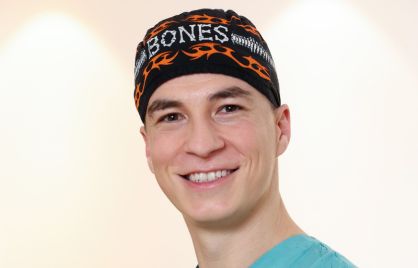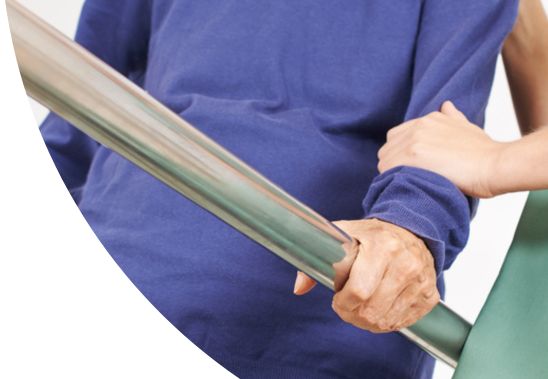4th June 2024
OrthoChats - Bronagh Tubridy - Arthroplasty Nurse
Bronagh Tubridy is an Arthroplasty Nurse within the Orthopaedics team at Mater Private Network in Dublin. Bronagh began her career as a general nurse, graduating with Bachelor of Science Degree in General Nursing from Dundalk Institute of Technology (DKIT) and has worked in a variety of settings since qualifying, including working in the theatre for the last 15 years.
Bronagh joined our team in 2022 in the role of a Clinical Nurse Manager 1 in the theatre. Through her passion for orthopaedics, specifically in the area of hip and knee, she pursued a career as an arthroplasty nurse in September 2023 and was trained under the supervision of our expert orthopaedic consultants.
.jpg?sfvrsn=f77d3aab_1)
Can you describe your role as an Arthroplasty Nurse? What does a day in your life look like?
In my role as an arthroplasty nurse, I assist orthopaedic surgeons during joint replacement surgeries, such as hip and knee replacements, and act as a liaison for patients throughout their journey with us.
My working day begins with preparing the operating theatre for the day ahead to ensure we have all the tools and equipment we need for surgery. By making sure everything is ready ahead of time, the team can focus entirely on surgery and well-being of our patients.
After performing surgeries in the operating theatre, I visit patients on the ward. This gives me the opportunity to introduce myself to patients who I will be in touch with throughout their recovery journey. It is very reassuring for patients when they have a point of contact post-surgery to allow them to discuss any concerns with the clinical team. When the patients are discharged from the hospital following their procedure, they can expect a call from me during week one and week three of their recovery. During these calls, I check on their progress, answer their queries and help prevent any potential problems that arise post-surgery.
Since the patients have met me during their recovery in the hospital, hearing a familiar voice on the phone can be very reassuring and make it easier to discuss various aspects of their recovery.
What types of patients do you typically treat?
Working as an arthroplasty nurse over the last number of years, I look after patients who require joint replacement surgeries, specifically hip or knee arthroplasty. Joint replacement surgery is oftentimes recommended to patients who experience conditions such as osteoarthritis and other degenerative joint diseases that cause significant pain and loss of function in the affected joints. Additionally, I also care for patients undergoing revision arthroplasty procedures.
Throughout their treatment journey, patients can expect to first meet me in the theatre on the day of surgery. Following their procedure, I check up on patients recovering in the ward and once they have been discharged, I remain in contact with them over the phone throughout their six-week recovery period.
Orthopaedics
The orthopaedics centre provides elective services for patients with acute and chronic musculoskeletal issues requiring reconstruction or joint replacement.
Learn more
What other teams do you collaborate with to deliver patient care?
At Mater Private Network, the multidisciplinary orthopaedic team consists of orthopaedic surgeons, an orthopaedic advanced nurse practitioner, physiotherapists, anaesthetists, theatre nurses, ward nurses and sometimes public health nurses within the community. In my role, I collaborate with various members of the orthopaedic team and wider network of staff across the hospital to ensure our patients have the best possible experience.
What are some of the common conditions you come across?
As part of my work, I come across patients facing various conditions that necessitate joint replacement surgeries. The most common conditions include arthritis, and in particular osteoarthritis, rheumatoid arthritis, post-traumatic arthritis, and hip dysplasia.
- Osteoarthritis is the most common type of arthritis and typically occurs due to the wear and tear of the cartilage that covers the end of bones in joints. As a result, the bones rub against each other, leading to pain, stiffness, and reduced mobility in the affected joint.
- Rheumatoid arthritis is caused by an autoimmune disorder, where the body’s immune system mistakenly attacks the body’s healthy tissue. Unlike the wear and tear damage caused by osteoarthritis, rheumatoid arthritis affects the lining of the joints, causing painful swelling and leading to bone erosion and deformity.
- Post-traumatic arthritis develops after an injury is sustained to the joint, such as a fracture or dislocation. The injury can damage the cartilage within the joint, leading to accelerated wear and tear over time.
Each type of arthritis has its own unique characteristics, but they all share the common feature of causing pain and impairment in the affected joint.
- Hip dysplasia, on the other hand, is a condition where the hip socket is abnormally shallow, causing the bone of the femur to not fit securely into the socket, resulting in instability of the hip. In adults, hip dysplasia can cause symptoms such as pain, stiffness, and difficulty walking.
What do you enjoy the most about your role?
The most enjoyable aspect of my role is the dynamic nature of working in both the theatre and clinical settings. In the theatre, I find fulfilment in assisting surgeries and witnessing how joint replacements are performed. Within the clinical setting, the opportunity to educate patients, support them through their recovery and witnessing improved quality of life post-surgery is why I love what I do.










-(1).jpg?sfvrsn=29f23156_1)
.jpg?sfvrsn=c361548b_1)

